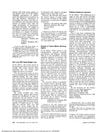 16 citations,
March 2007 in “The Veterinary clinics of North America. Food animal practice”
16 citations,
March 2007 in “The Veterinary clinics of North America. Food animal practice” Proper mineral supplementation in cow-calf operations prevents health issues and economic losses.
 August 2023 in “Natural Resources for Human Health”
August 2023 in “Natural Resources for Human Health” Vegetarians should take B vitamin supplements to avoid health issues.
[object Object]  1 citations,
February 2021 in “Animal feed science and technology”
1 citations,
February 2021 in “Animal feed science and technology” Organic selenium may offer better retention and less waste in puppies.
 29 citations,
December 2017 in “Molecular therapy”
29 citations,
December 2017 in “Molecular therapy” Enzyme replacement therapy improved multiple symptoms of homocystinuria in mice.
 7 citations,
December 2011 in “Elsevier eBooks”
7 citations,
December 2011 in “Elsevier eBooks” The document concludes that early diagnosis and treatment are crucial for managing skin diseases in ferrets.
 5 citations,
December 1942 in “Journal of the American Medical Association”
5 citations,
December 1942 in “Journal of the American Medical Association” Choline and biotin are important for liver health and preventing certain deficiencies in animals, and more research is needed to understand their benefits in humans.
12 citations,
December 1951 in “Experimental Biology and Medicine” Liver in the diet reduces cortisone acetate toxicity effects in rats.
12 citations,
October 1952 in “Experimental biology and medicine” Vitamin B12 and aureomycin reduce the negative effects of high doses of cortisone in rats.
17 citations,
December 1951 in “Experimental biology and medicine” Vitamin B12 and aureomycin can reverse or reduce cortisone's negative effects on body and hair growth in rats.
146 citations,
September 2013 in “Advances in nutrition” Bariatric surgery can cause serious mineral deficiencies, requiring better patient education and monitoring.
30 citations,
September 2016 in “Aging Cell” Low selenium levels can extend lifespan but worsen health issues.
 January 2021 in “Middle East journal of applied sciences”
January 2021 in “Middle East journal of applied sciences” Zinc is essential for plant growth and human health, but many soils lack enough zinc, affecting crops and potentially leading to health problems.
11 citations,
January 2016 in “BMC veterinary research” Urinary Se to creatinine ratio, serum Se, and glutathione peroxidase are effective early biomarkers for selenium status in dogs.
 14 citations,
August 2016 in “Journal of nanomedicine research”
14 citations,
August 2016 in “Journal of nanomedicine research” Zinc oxide nanoparticle biscuits improved growth and health in zinc-deficient rats without toxicity.
 79 citations,
January 2017 in “Dermatology practical & conceptual”
79 citations,
January 2017 in “Dermatology practical & conceptual” Correcting nutrient deficiencies may help with hair loss, but the benefits of supplements without a deficiency are uncertain and could be harmful.
 5 citations,
January 2003 in “Oilseeds and fats, crops and lipids/OCL. Oilseeds & fats crops and lipids”
5 citations,
January 2003 in “Oilseeds and fats, crops and lipids/OCL. Oilseeds & fats crops and lipids” Vegetable protein lowers cholesterol and protein deficiency can cause health issues.
 5 citations,
February 1977 in “Archives of Dermatology”
5 citations,
February 1977 in “Archives of Dermatology” Eating more protein during fast weight loss can prevent hair loss.
 47 citations,
December 2006 in “Therapy”
47 citations,
December 2006 in “Therapy” The dietary supplement helped increase hair growth in women with hair loss.
[object Object]  11 citations,
September 2012 in “Journal of animal physiology and animal nutrition”
11 citations,
September 2012 in “Journal of animal physiology and animal nutrition” Higher protein diets with DL-methionine improve mink hair growth and fur quality.
 11 citations,
September 2007 in “Advances in therapy”
11 citations,
September 2007 in “Advances in therapy” INVERSION Femme supplement helped women lose weight, reduce hair loss, and improve skin and nail health.
 3 citations,
October 2022 in “Han'gug dongmul jawon gwahag hoeji/Han-guk dongmul jawon gwahak hoeji/Journal of animal science and technology”
3 citations,
October 2022 in “Han'gug dongmul jawon gwahag hoeji/Han-guk dongmul jawon gwahak hoeji/Journal of animal science and technology” Adding L-glutamine to the diet of Hanwoo steers may boost their immune system and help them cope with heat.
 November 2016 in “Zoo biology”
November 2016 in “Zoo biology” Adding more vegetables and fruits improved capybaras' coat quality and health.
 10 citations,
May 1986 in “Experientia”
10 citations,
May 1986 in “Experientia” Too much zinc in the diet can cause hair loss and color change in young mice by reducing copper in the body.
 February 2022 in “International journal of KIU”
February 2022 in “International journal of KIU” Certain genes and nutrients like vitamin D, zinc, and omega fatty acids affect COVID-19 severity and infection risk.
 January 2020 in “Asian Journal of Basic Science & Research”
January 2020 in “Asian Journal of Basic Science & Research” Nutrease powder, a high-protein, low-carb supplement, can help manage Polycystic Ovary Syndrome symptoms, regulate periods, improve ovulation, and restore fertility.
 August 2024 in “Frontiers in Nutrition”
August 2024 in “Frontiers in Nutrition” Antioxidant-rich diets may reduce hair loss risk, while pro-inflammatory diets may increase it, especially in women.
 August 2022 in “Italian Journal of Animal Science/Italian journal of animal science”
August 2022 in “Italian Journal of Animal Science/Italian journal of animal science” Field bean supplementation improved mohair growth and kid growth in Angora goats but didn't prevent weight loss after giving birth.
 March 2024 in “Animal nutrition”
March 2024 in “Animal nutrition” Adding both soluble and insoluble fibers, especially beet pulp, to the diet of pregnant sows helps improve their health and the growth of their piglets in hot weather.
 February 2024 in “Animals”
February 2024 in “Animals” Giving selenium yeast to pregnant goats leads to better hair growth and cashmere quality in their babies.
March 2021 in “World rabbit science” Adding 0.2% taurine to Angora rabbits' diet improves wool production and overall health.























